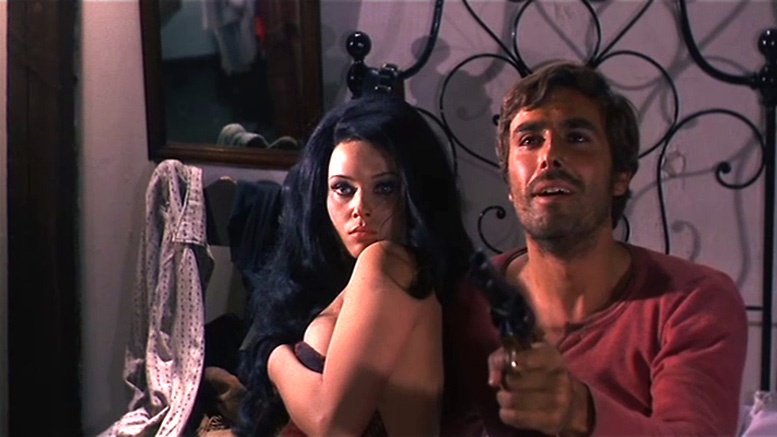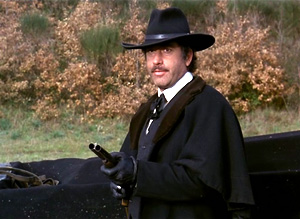
Aka Il tempo degli avvoltoi (Int), Les vautours attaquent (Fr), Die Zeit der Geier (WG)
1967
Italy
Vico [Pier Ludovico] Pavoni for Pacific Cin.ca
Director: Nando Cicero
Story & Screenplay: Fulvio Gicca
Cinematography: Fausto Rossi {Eastmancolor}
Music: Piero Umiliani
Editor: Renato Cinquini
Set design: Demofilo Fidani
Cameraman: Sergio Bergamini
Release information: Registered 12.07.67. Italy (02/08/67, 95 mins), France (Paris, 1970), Germany (25.10.68 – 84′)
Cast: George Hilton (Kitosch), Frank Wolff (Manuel Tracy), Pamela Tudor (Steffi Mendoza), Eduardo Fajardo (don Jaime Mendoza), Franco Balducci (Francisco), Femi Benussi (Rubia), John [Janos] Bartha (Mijano), Cristina Josani (a senorita), Maria Grazia Marescalchi (‘Traps’), Gian Luigi Crescenzi, Ivan Scratuglia, Gino Vangiluca, Guglielmo Spoletini (Camaro), Tullio Altamura, Alfonso Donati

This low-key item is a bit of a favourite of mine, and shows George Hilton at his best with a performance that seems to encapsulate the intriguing divisions within his acting persona. Fluctuating between the amiable drunken hedonist, the reasonably aggrieved gunfighter and the complete bastard, he manages to maintain a slightly bitter edge that was to disappear in latter productions which tended to overplay their comic intentions.
He plays Kitosch, a cattle keeper at the ranch of Don Jaime (Eduardo Fajardo), who is continually courting trouble with his philandering. When he is discovered with the boss’s wife (Pamela Tudor) he is branded in an attempt to quell his libido. Needless to say, he isn’t that happy about this and decides to leave, much to the consternation of those he has already aggrieved. On reaching a nearby town, he finds that all the horses have been taken and – fearing for his life – goes to the local Sheriff for help. Unfortunately, he is arrested instead and locked up to await the arrival of Don Jaimie’s men.
At this point Black Tracy (Frank Wolff), a criminal with a price on his head who drives a handy-dandy hearse turns up and, in the act of evading capture, manages to hook up with Kitosch. Together they head towards the border and are soon on the way to becoming unsteady partners.
Unfortunately, it is also becoming increasing clear that Tracy is not quite the cool cat he had originally appeared. When he isn’t in the grip of an epileptic fit (or, as one politically correct character suggests, possessed by the devil) he is single-mindedly pursuing his ex-wife Traps (Maria Grazia Marescalchi) and her lover, Big John. After burning the former alive, he catches up with the latter during a gold robbery and – as well as snatching the booty – tortures him to death (“I always said that one day I’d screw you to the front door of my house. Well, look behind you. Yes, it’s my front door!”) Kitosch, being a genial sort of soul, find this rather disconcerting and attempts to subdue his friend’s psychotic impulses, but with little success. Eventually the disparate duo set their sight on Don Jaimie’s fortune, thereby setting up a nice climax in which the true shape of the assorted characters sensibilities can be revealed.

Okay, Last of the Badmen isn’t earth shattering, but it is a sturdy effort that benefits from some nicely judged performances from the lead characters and some technical proficiency from behind the screen. As well as Hilton, Wolff is excellent in an unusually unsympathetic role (he is best known for his parts as Brett McBain in Once Upon a Time in the West (C’era una volta il West, 68) and the likeable sheriff in Sergio Corbucci’s astounding The Great Silence (Il Grande silenzio, 68)). Eduardo Fajardo is given a bit more depth than normal in that his moustachioed sleazeball isn’t actually a out-and-out villain for once. Hilton recalled that: “I was very friendly with Cicero, and I also know his wife. We got on very well, because he let me do my own thing and my performance was a little hammy, and he was pleased that the performance was a little on the edge.” [Cine70 #7]
There’s a jaunty soundtrack from Piero Umiliani that sounds as though it should be in a Bond rip-off and the director, Nando Cicero, shows that he knows his stuff. Way down the credits lurks the name of cult hero Demofilio Fidani in his set designer incarnation, but don’t let that put you off as this is well worth catching if you get the chance.
For me this is one of Frank Wolff’s best performances. He’s suave, charismatic, evil and down right disgusting all in one performance. As you stated it’s not a genre changer and starts out like a typical George Hilton comedy western but it turns almost supernatural but it actually works for a change. Hilton is always fun to watch but he takes a backseat here when Frank Wolff steps in. The film is worth searching out just to see Frank Wolff’s performance.